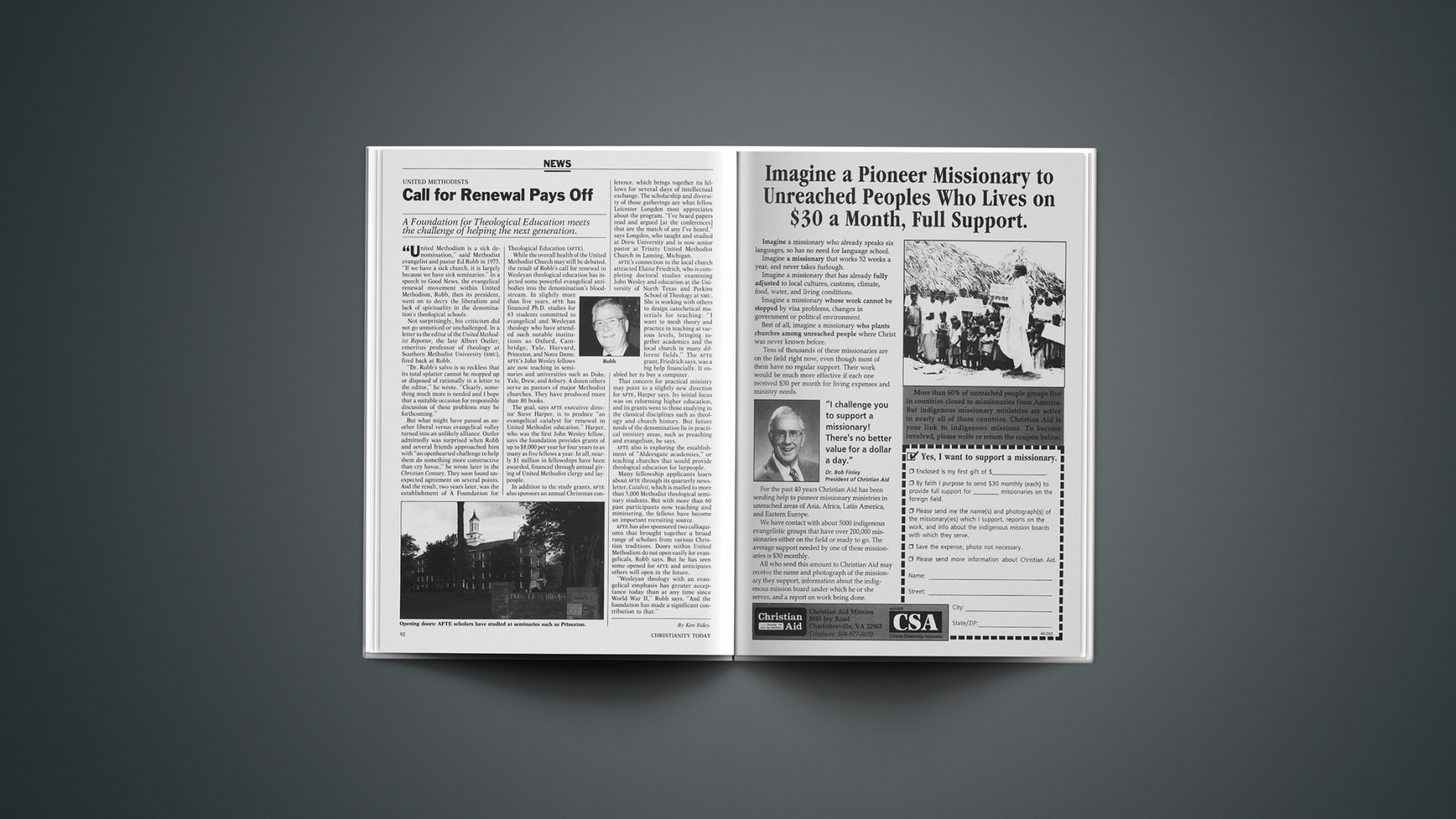A Foundation for Theological Education meets the challenge of helping the next generation.
“United Methodism is a sick denomination,” said Methodist evangelist and pastor Ed Robb in 1975. “If we have a sick church, it is largely because we have sick seminaries.” In a speech to Good News, the evangelical renewal movement within United Methodism, Robb, then its president, went on to decry the liberalism and lack of spirituality in the denomination’s theological schools.
Not surprisingly, his criticism did not go unnoticed or unchallenged. In a letter to the editor of the United Methodist Reporter, the late Albert Outler, emeritus professor of theology at Southern Methodist University (SMU), fired back at Robb.
“Dr. Robb’s salvo is so reckless that its total splatter cannot be mopped up or disposed of rationally in a letter to the editor,” he wrote. “Clearly, something much more is needed and I hope that a suitable occasion for responsible discussion of these problems may be forthcoming.”
But what might have passed as another liberal versus evangelical volley turned into an unlikely alliance. Outler admittedly was surprised when Robb and several friends approached him with “an openhearted challenge to help them do something more constructive than cry havoc,” he wrote later in the Christian Century. They soon found unexpected agreement on several points. And the result, two years later, was the establishment of A Foundation for Theological Education (AFTE).
While the overall health of the United Methodist Church may still be debated, the result of Robb’s call for renewal in Wesleyan theological education has injected some powerful evangelical antibodies into the denomination’s bloodstream. In slightly more than five years, AFTE has financed Ph.D. studies for 63 students committed to evangelical and Wesleyan theology who have attended such notable institutions as Oxford, Cambridge, Yale, Harvard, Princeton, and Notre Dame. AFTE’s John Wesley fellows are now teaching in seminaries and universities such as Duke, Yale, Drew, and Asbury. A dozen others serve as pastors of major Methodist churches. They have produced more than 80 books.
The goal, says AFTE executive director Steve Harper, is to produce “an evangelical catalyst for renewal in United Methodist education.” Harper, who was the first John Wesley fellow, says the foundation provides grants of up to $8,000 per year for four years to as many as five fellows a year. In all, nearly $1 million in fellowships have been awarded, financed through annual giving of United Methodist clergy and laypeople.
In addition to the study grants, AFTE also sponsors an annual Christmas conference, which brings together its fellows for several days of intellectual exchange. The scholarship and diversity of those gatherings are what fellow Leicester Longden most appreciates about the program. “I’ve heard papers read and argued [at the conferences] that are the match of any I’ve heard,” says Longden, who taught and studied at Drew University and is now senior pastor at Trinity United Methodist Church in Lansing, Michigan.
AFTE’s connection to the local church attracted Elaine Friedrich, who is completing doctoral studies examining John Wesley and education at the University of North Texas and Perkins School of Theology at SMU. She is working with others to design catechetical materials for teaching. “I want to mesh theory and practice in teaching at various levels, bringing together academics and the local church in many different fields.” The AFTE grant, Friedrich says, was a big help financially. It enabled her to buy a computer.
That concern for practical ministry may point to a slightly new direction for AFTE, Harper says. Its initial focus was on reforming higher education, and its grants went to those studying in the classical disciplines such as theology and church history. But future needs of the denomination lie in practical ministry areas, such as preaching and evangelism, he says.
AFTE also is exploring the establishment of “Aldersgate academies,” or teaching churches that would provide theological education for laypeople.
Many fellowship applicants learn about AFTE through its quarterly newsletter, Catalyst, which is mailed to more than 5,000 Methodist theological seminary students. But with more than 60 past participants now teaching and ministering, the fellows have become an important recruiting source.
AFTE has also sponsored two colloquiums that brought together a broad range of scholars from various Christian traditions. Doors within United Methodism do not open easily for evangelicals, Robb says. But he has seen some opened for AFTE and anticipates others will open in the future.
“Wesleyan theology with an evangelical emphasis has greater acceptance today than at any time since World War II,” Robb says. “And the foundation has made a significant contribution to that.”
By Ken Sidey.










